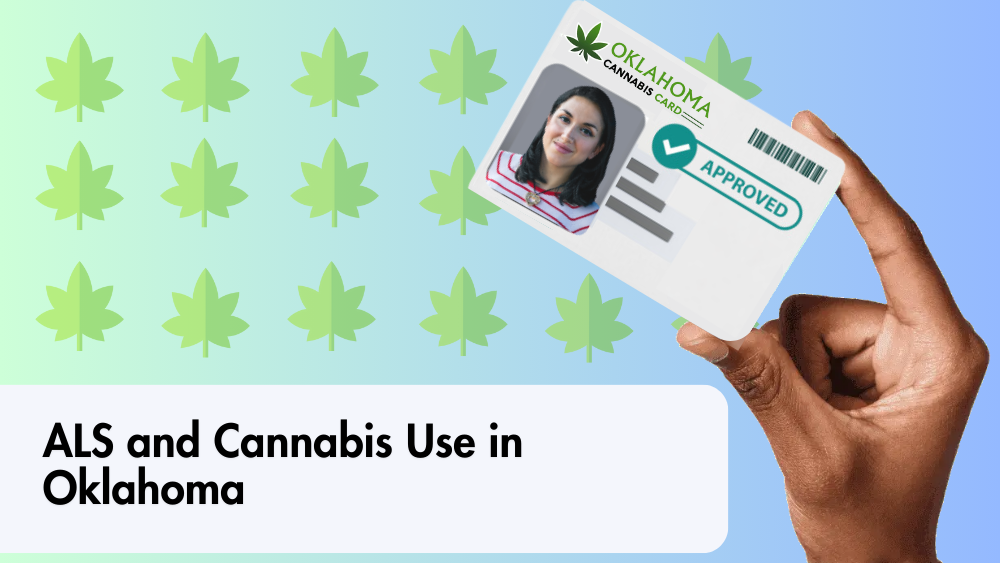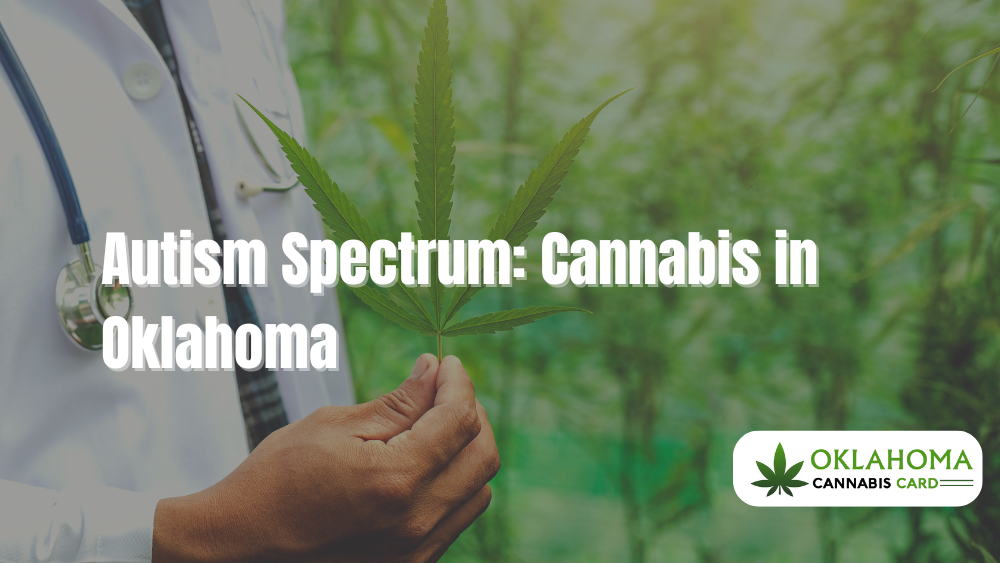 Amyotrophic Lateral Sclerosis (ALS), also known as Lou Gehrig’s disease, is a devastating neurodegenerative disorder that affects nerve cells in the brain and spinal cord. For those battling this condition in Oklahoma, the journey can be challenging. However, with the legalization of medical marijuana in the state, many patients are turning to cannabis as a potential source of relief. This article aims to shed light on how medical marijuana might benefit ALS patients in Oklahoma and guide you through the process of accessing it legally.
Amyotrophic Lateral Sclerosis (ALS), also known as Lou Gehrig’s disease, is a devastating neurodegenerative disorder that affects nerve cells in the brain and spinal cord. For those battling this condition in Oklahoma, the journey can be challenging. However, with the legalization of medical marijuana in the state, many patients are turning to cannabis as a potential source of relief. This article aims to shed light on how medical marijuana might benefit ALS patients in Oklahoma and guide you through the process of accessing it legally.
Table OF Content
- 1 Understanding ALS and Its Challenges
- 2 The Potential of Cannabis in ALS Treatment
- 3 How Cannabis May Help ALS Patients
- 4 Accessing Medical Marijuana for ALS in Oklahoma
- 5 Choosing the Right Cannabis Products for ALS
- 6 Legal Considerations and Safety
- 7 Personal Stories: ALS Patients and Cannabis in Oklahoma
- 8 Conclusion
- 9 Frequently Asked Questions
- 10 1. Is medical marijuana legal for ALS patients in Oklahoma?
- 11 2. How do I get a medical marijuana card in Oklahoma?
- 12 3. Will cannabis cure my ALS?
- 13 4. Are there any side effects of using cannabis for ALS?
- 14 5. Can I grow my own cannabis in Oklahoma?
- 15 6. How often do I need to renew my medical marijuana card?
Understanding ALS and Its Challenges
ALS is a progressive disease that causes the death of neurons controlling voluntary muscles. This leads to muscle weakness, difficulty in movement, speech, and eventually breathing. The emotional and physical toll on patients and their families can be immense. While there’s no cure for ALS, various treatments aim to improve quality of life and manage symptoms.
The Potential of Cannabis in ALS Treatment
Recent studies have shown promising results regarding the use of cannabis in managing ALS symptoms. While more research is needed, many patients report improvements in areas such as:
- Pain management
- Muscle spasticity
- Sleep quality
- Appetite stimulation
- Mood enhancement
Dr. Emily Johnson, a neurologist specializing in ALS treatment, states, “While cannabis isn’t a cure, many of my patients have experienced significant symptom relief, particularly in managing pain and muscle spasms associated with ALS.”
How Cannabis May Help ALS Patients
Cannabis contains compounds called cannabinoids, primarily THC (tetrahydrocannabinol) and CBD (cannabidiol). These interact with the body’s endocannabinoid system, potentially offering various therapeutic effects:
- Pain Relief: Cannabis may help manage neuropathic pain common in ALS.
- Muscle Relaxation: THC has shown potential in reducing muscle spasticity.
- Neuroprotection: Some studies suggest cannabinoids may have neuroprotective properties, potentially slowing disease progression.
- Appetite Stimulation: Cannabis can help combat the weight loss often associated with ALS.
- Mood Enhancement: The psychological benefits of cannabis may help patients cope with the emotional challenges of ALS.
Accessing Medical Marijuana for ALS in Oklahoma
Oklahoma has one of the most patient-friendly medical marijuana programs in the United States. Here’s how ALS patients can access cannabis legally:
- Confirm Eligibility: ALS is a qualifying condition for medical marijuana in Oklahoma.
- Consult a Physician: Schedule an appointment with a registered medical marijuana doctor. They will evaluate your condition and, if appropriate, provide a recommendation.
- Apply for a Medical Marijuana Card: With your physician’s recommendation, apply for your card through the Oklahoma Medical Marijuana Authority (OMMA).
- Visit a Dispensary: Once approved, you can purchase cannabis products from licensed dispensaries across the state.
For a streamlined process, consider using Oklahoma Cannabis Card, which provides an Oklahoma Medical Marijuana Card for $129, renewable every two years for $99.
Choosing the Right Cannabis Products for ALS
With a variety of cannabis products available, it’s essential to find what works best for you. Options include:
- Oils and Tinctures: Easy to dose and long-lasting effects.
- Edibles: Provide prolonged relief but may have delayed onset.
- Vaporizers: Offer quick relief and are easier on the lungs than smoking.
- Topicals: May help with localized pain and muscle spasms.
Always start with a low dose and gradually increase as needed, under the guidance of your healthcare provider.
Legal Considerations and Safety
While medical marijuana is legal in Oklahoma, it’s crucial to remember:
- Only purchase from licensed dispensaries.
- Keep your medical marijuana card current.
- Don’t drive under the influence of cannabis.
- Store cannabis products safely, away from children and pets.
Personal Stories: ALS Patients and Cannabis in Oklahoma
John, a 52-year-old ALS patient from Tulsa, shares, “Medical marijuana has been a game-changer for me. It helps me sleep better and has significantly reduced my muscle spasms. I feel more in control of my symptoms.”
Sarah, a caregiver for her mother with ALS, notes, “We were hesitant at first, but after seeing how cannabis improved Mom’s appetite and mood, we’re grateful for this option in Oklahoma.”
Conclusion
While cannabis isn’t a cure for ALS, it offers potential benefits that many patients find valuable in managing their symptoms and improving quality of life. As an ALS patient in Oklahoma, you have the legal right to explore this treatment option. Always consult with your healthcare team to determine if medical marijuana is appropriate for your situation and to ensure it complements your overall treatment plan.
Frequently Asked Questions
1. Is medical marijuana legal for ALS patients in Oklahoma?
Yes, ALS is a qualifying condition for medical marijuana use in Oklahoma.
2. How do I get a medical marijuana card in Oklahoma?
You need a recommendation from a registered physician and then apply through the Oklahoma Medical Marijuana Authority (OMMA).
3. Will cannabis cure my ALS?
No, cannabis is not a cure for ALS. It may help manage symptoms and improve quality of life for some patients.
4. Are there any side effects of using cannabis for ALS?
Potential side effects can include dizziness, dry mouth, and changes in appetite. Always consult your doctor about potential interactions with other medications.
5. Can I grow my own cannabis in Oklahoma?
Yes, registered patients can legally grow up to six mature plants and six seedlings for personal use.
6. How often do I need to renew my medical marijuana card?
In Oklahoma, medical marijuana cards need to be renewed every two years.





